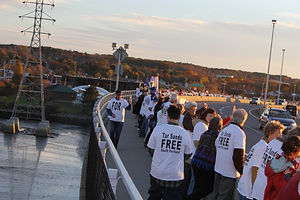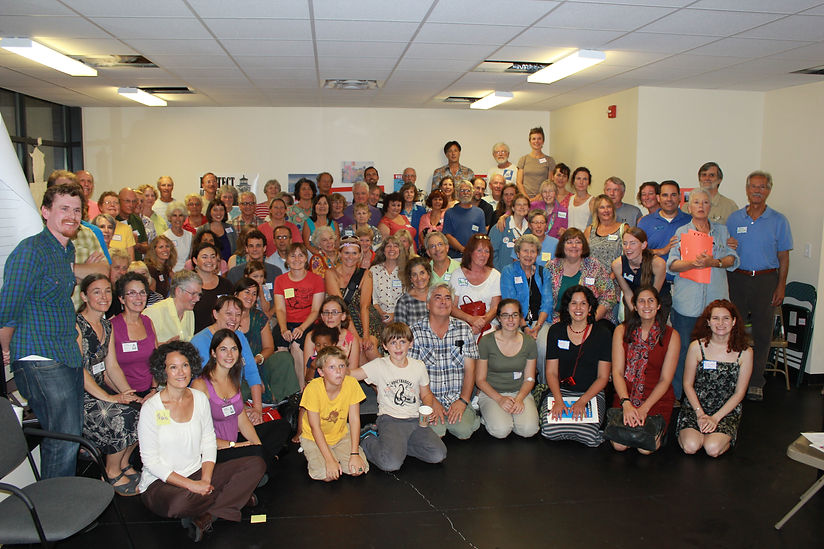
Clear Skies ordinance
History
When Portland Pipeline, a subsidiary of ExxonMobil and Suncor, tried to build a tar sands export terminal next to Bug Light Park on the shores of Casco Bay in South Portland, Maine, the community banded together to launch a strong, intense, and successful effort to block the oil industry. The oil company wanted to reverse the flow of an aging pipeline to transport tar sands oil, a thick, heavy sludge from the ravaged Alberta arboreal forest in Canada, where the oil industry has destroyed an area the size of Greece. It would have then traveled through Canada, Vermont, New Hampshire, and Maine to be exported in tankers from South Portland. This 75 year old pipeline currently passes through many water sources, including Sebago Lake which provides drinking water to 20% of Maine's population. Their plan was to build two 70 foot smokestacks on the shore of Casco Bay. These stacks would emit toxic carcinogenic fumes into our neighborhoods, threatening our health and imperiling our crucial marine and tourism industries.
A groundswell of community support resulted in the passage of South Portland's Clear Skies Ordinance in 2014. It stopped corporate oil in its tracks. It was a battle and confirmation for a community's right for self determination to protect its citizens, and to protect our planet from the dirtiest oil on earth.
Protect South Portland’s purpose is to ensure that permits are never issued for a tar sands oil project, and that a land use ordinance is put in place to prevent tar sands oil from ever being brought to our city. By working together, we can keep our community healthy, clean, and thriving!

What is the clear sky ordinance?
The Clear Skies Ordinance bans the loading of crude oil onto tankers in South Portland's harbor. The process of loading crude oil, especially crude derived from tar sands, is accompanied by the emission of toxic chemicals. The ordinance is based on the city’s home rule authority and its right to regulate air quality for the health and welfare of its citizens. Hence, its name.
How did the ordinance come into being?
Stemming from small gatherings of South Portland residents in a living room in early 2013 when it became known that Portland Pipeline had been planning to change from an importing to an exporting pipeline by reversing the flow of its line to bring tar sands oil to load onto tankers in our harbor, a grassroots movement developed and spread throughout our community.

South Portland residents volunteered to do door to door canvassing, letter writing, phone calling, lobbying city councilors, writing articles for local papers, and showing up at demonstrations, as well as at every city council meeting or workshop, for well over a year. With a David and Goliath fight on our hands, we put all our trust in the power of people working together to protect the city.

Initially, we suffered a close defeat at the polls when the Waterfront Protection Ordinance was defeated by 193 votes in the 2013 November election. But that defeat only reinforced our dedication to keep our grassroots effort going. The resulting reward for the determination of our citizens was the passage of the Clear Skies Ordinance by the South Portland City Council with a vote of 6-1 on July 21, 2014.
Twenty days later, when it officially became law, South Portland effectively shut down the possibility of bringing tar sands from Alberta, Canada to Casco Bay in Maine via the Portland Montreal Pipeline. This was a hard fought victory, lasting many months. What started with a small group of people grew into a groundswell of community support and a determined effort. Most importantly, it was the result of citizen power rising up against the power of Big Oil.
South Portland takes on big oil
Portland Pipeline sued the City of South Portland in Federal Court on nine points. One of these cited the Interstate Commerce Clause of the Constitution, and alleged that the city had overstepped its authority to legislate for a company engaged in business across state borders. After a long and tortuous process of discovery, the judge dismissed eight of the original points that would have been in favor of the city, but reserved the final point that involved the constitutional issue for further investigation. Two bench trials were held over a period of about ten months, the last of which occurred in June 2018 and lasted four days.
Finally, in late August 2018, the judge ruled in favor of South Portland, declaring that the Clear Skies Ordinance did not violate the Commerce Clause. This is a victory for local authority in matters of the health and welfare of its citizens and has been of great interest to other U.S. communities fighting pipelines and transmission lines that would effect the quality of their environment.
SUCCESS
Portland Pipeline appealed Judge Woodcock’s decision to the First District Court of Appeals in Boston. Both parties filed their opinions with the court.
After a battle of 8 years, the Portland Pipeline withdrew its last appeal to nullify the Clear Skies Ordinance. The long road that lead us to this success has been paved with the thousands of people who have contributed in so many ways. South Portland residents spent numerous hours canvassing, making phone calls, writing letters to the editor, attending rallies and city council meetings and donating what money they could. Our city is committed to keeping our neighborhoods safe and our air clean.
More info

South Portland, pipeline company square off before high court
The city is fighting to protect an ordinance that would bar the Portland Pipe Line Corp. from importing tar sands oil from Canada. READ MORE
September 17, 2020
Sean Murphy
Federal appeals court asks Maine’s top judges to rule on South Portland pipeline case
SOUTH PORTLAND — Maine’s top state judges could decide the outcome of a nearly 5-year-old federal court battle between the city of South Portland and the Portland Pipe Line Corp. READ MORE
January 15, 2020
Kelley Bouchard
Federal Appeals Court Hears Arguments in South Portland Pipeline Case
SOUTH PORTLAND — Approved 5 years ago, the Clear Skies ordinance blocked the company from reversing the flow of its oil pipeline running from Portland Harbor to Montreal. READ MORE
July 23, 2019
Kelley Bouchard
related articles
SoPo Clear Skies Ordinance reaffirms the power of grassroots organizing
September 17, 2018
The news was very, very good Aug. 24 when Judge Woodcock of the federal district court ruled that South Portland’s Clear Skies Ordinance would stand. READ MORE

Mary-Jane Ferrier
South Portland’s Tar Sands Ban Upheld in a 'David vs. Goliath' Pipeline Battle
AUG 28, 2018
Citing Maine’s 'home rule authority' to protect public health, the small city took on Big Oil, which lined up behind a company challenging its tar sands ban. READ MORE

Sabrina Shankman
South Portland’s ‘Clear Skies’ ordinance survives challenge as federal judge finds it constitutional
August 24, 2018
Portland Pipe Line Corp. had sued to overturn the ordinance adopted in 2014 to prohibit the bulk loading of crude oil onto tankers on the city's waterfront. READ MORE

Randy Billings
November 21, 2017
This Coastal Town Banned Tar Sands and Sparked a War with the Oil Industry
Hundreds of miles from the nearest oil field or fracking well, the answer to this question is playing out here, as a longrunning David-and-Goliath battle over plans to pipe tar sands oil from Canada to Maine for export nears a pivotal moment. READ MORE

Sabrina Shankman
AUG 31, 2018
Pipeline ruling shockwaves felt across Canada
A pivotal pipeline ruling by Canada's second-highest court will send ripple effects beyond British Columbia and Alberta, potential forcing Justin Trudeau's Liberal government to rethink its entire approach to pipelines, resource development and reconciliation, experts say. READ MORE

David P. Ball
July 31, 2018
Court decision means Portland can sharply restrict fossil fuel terminal expansion
The city of Portland's 2016 ordinance barring new or significantly expanded fossil fuel terminals survived a legal challenge to the state's highest court. READ MORE

Steve Law








